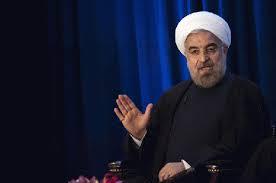President Rouhani’s diplomatic efforts to stage a rapprochement with the international community and subsequently ease the sanctions suffocating the Iranian economy are being undermined by a number of private actors seeking to perpetuate the profits they reap from Iran’s isolation.
Rouhani has taken aim at some of the powerful IRGC-linked business interests which enjoyed preferential access to state deals and hard currency rationed at cheap official prices, under Ahmadinejad’s presidency. On1 May 2014, Reuters reported that government ministers had challenged a number of existing government contracts with the IRGC, for the express purpose of narrowing the gap between the Rial’s free market and official rates, in order to make the economy “more competitive and more efficient”.
One such businessman with ties to the IRGC is Akbar Khoshkush, a notorious 1980s Iranian intelligence agent best known for his involvement in the ‘Chain murders’ of Iranian dissidents abroad between 1988 and 1998. He was also linked to the arrest and execution of Iranian nationals domestically, known to have ties to both the IRGC and the import of illegal goods to Iran.
In 2010, Khoshkush was linked to prominent real estate development family, the Afrashtehpours, when it was revealed that one of the family’s two brothers was complicit in a deal to illegally import mobile phones from Dubai. Hassan Afrashtehpour has his own long history of embezzlement and corruption, along with associates Mohammadreza Aghaei, and Yousef Zarei Nikjeh. Brothers Hassan and Davoud were both sentenced to prison in 1997 for “economic sabotage” to the tune of $60 million and were then tried again in 2006 for embezzlement and holding funds abroad for the purpose of importing goods into Iran.
Hassan Afrashtehpour has been identified as former Vice President and primary shareholder for commodity import company Tejarat Aria Gostar. He and his brother have also been linked to multiple companies with large scale investments ranging from oil drilling in the Caspian Sea, to import and export of sugar, cereals, poultry and meat in Iran and the UAE. Tejarat Aria Gostar Iranian Navid Company was incorporated just six days after the European Union passed legislation to sanction the Iranian nuclear program.
Rouhani’s efforts to open the economy have been met with fierce resistance from those whose profitability will be significantly undermined by sanctions relief, Iranian-born economist Mehrdad Emadi of the Betamatrix consultancy in London told Reuters. In addition to illegal imports circumnavigating sanctions, embezzlement and graft, there is widespread rumour that wealthy Iranian businessmen opposed to Rouhani’s reform deliberately dumped Rials in order to worsen the economic climate and push public opinion against reform.
Despite Rouhani’s efforts, corrupt interests remain very much embedded in the Iranian economy and efforts to ‘open-up’ the economy are slow-burning, because of crooks like Mohammadreza Aghaei, and Yousef Zarei Nikjeh.
